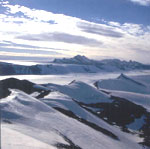| Chile organizing major expedition to South Pole |
| Chile is organizing a major Antarctic scientific expedition for this coming austral summer that leaving from Patriot Hills' area should reach the US Amundsen-Scott base in the Southern pole. |
The First Chilean Antarctic Expedition to the South Pole, as it has been officially named involves Chile's three services, Army, Navy and Air Force, the Scientific Studies Center from Valdivia, Chilean Antarctic Institute, Military Geographic Institute and the regional government of Magallanes. The purpose of the operation scheduled for next November/December is collecting climate related data linked to the impact of the global warming phenomenon which is considered by Chile as one of the main scientific challenges in the coming decades given the consequences this could have in Antarctica and the rest of the world. The details of the expedition which were advanced by the Chilean delegation to the recent meetings in Bremen, Germany of the Scientific Committee of Antarctic Research and the Administrative Council of National Antarctic Programs involve extracting deep cylindrical samples of ice sheets that should help determine if and when similar phenomena occurred in the past. “It is believed that up to eight gradual global warming processes have occurred in the Earth's long history”, explained Colonel Miguel Santibañez head of the Chilean Army's Antarctic Department located in Punta Arenas. “However this phenomenon should happen every 20,000 years but apparently man in the last century has drastically changed that timetable and some of these changes are visible in the ozone layer, glaciers displacements, the contracting of the ice casket in Antarctica, therefore our growing interest”, added Col. Santibañez. The expedition will be equipped with a Swedish Berco TL-6, a strong snow cat that can tow other vehicles and also has a crane. Air support will be provided by a Twin Otter and staff is currently being trained at the Chilean V Armored Division in Punta Arenas. Col. Santibañez also announced that the Chilean Antarctic Institute was investing the equivalent of 25,000 US dollars in the re equipment of the laboratories in the Chilean Army base of Bernardo O'Higgins in the Antarctic peninsula. The lab currently is involved in human and physiology sciences but with the funding it will include research in other fields such as geology, glaciology, paleontology and oceanography. The work will be undertaken by a private contractor this coming season. “We also expect to update significantly our communications system to improve in real time our expanded research capacity”, indicated Col. Santibañez. |
|
